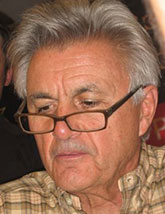John Irving
Critique • Works • Views and quotes
Born
Exeter, New Hampshire, United States, 1942
Publications
Novels, stories, essays, memoirs
Genres
Literary
Writing language
English
Country
United States/Canada
Literature
• The World According to Garp (1978)
• A Prayer for Owen Meany (1989)
Novels
• The World According to Garp (1978)
• The Cider House Rules (1985)
• A Prayer for Owen Meany (1989)
American Literature
• The World According to Garp (1978)
• The Hotel New Hampshire (1981)
• The Cider House Rules (1985)
• A Prayer for Owen Meany (1989)
On books, writers and writing
1986
Titles are important; I have them before I have books that belong to them. I have last chapters in my mind before I see first chapters, too. I usually begin with endings, with a sense of aftermath, of dust settling, of epilogue. I love plot, and how can you plot a novel if you don’t know the ending first? How do you know how to introduce a character if you don’t know how he ends up? You might say I back into a novel. All the important discoveries—at the end of a book—those are the things I have to know before I know where to begin.
Interview in "John Irving, The Art of Fiction No. 93", The Paris Review
1988
Writing a novel is actually searching for victims. As I write I keep looking for casualties. The stories uncover the casualties.
Interview in Writers at Work: The Paris Review Interviews, Eighth Series
1999
[On Tom Wolfe's book The Right Stuff]
Oh please. If I were interested in astronauts I would have tried to be one. Bullshit.....
He's a journalist, man, he's a journalist. He doesn't know how to write fiction, he can't create a character, he can't create a situation....
I'm using the argument against him that he can't write, that his sentences are bad, that it makes you wince. It's like reading a bad newspaper or a bad piece in a magazine. It makes you wince, it makes you wince. You know, if you were a good skater, could you watch someone just fall down all the time? Could you do that? I can't do that.
Interview on CBC program Hot Type
2009
I have to be faithful to those novels that made me want to be a writer. And it was the novels of Dickens that I first read at age fourteen, fifteen that made me wish I could tell a story like that. Much of modern literature, post-modern literature disappointed me compared to those long plot-driven, character-driven stories of the nineteenth century, not just Dickens, but Thomas Hardy, Melville, among Americans as you say, Hawthorne too, Tolstoy, Turgenev, Flaubert, some George Eliot. I just gravitated to those stories that seemed to me for the most part to have been written to move a reader emotionally more than impress him intellectually....
Those writers were aware of readers, they were aware of an audience. And before I loved novels, I loved the theatre and in my teenage years and in my twenties I imagined I might be either an actor or a writer—I wasn't sure of which—but I think I brought something of the stage to the novel, the idea that you are aware of an audience, you are playing to an audience as an actor, you are writing to a reader as an author, and that's something that was lost in the twentieth, especially the late twentieth century....
The living writers whose work I most admire, however, very much resemble nineteenth-century storytellers—Gunter Grass, Salmon Rushdie, Umberto Eco, Garcia Marquez—these people are writing plotted, character-driven stories. They're very much writing in the vein of nineteenth-century storytellers.
Interview on Spotlight, Russia Today
2016
I can't help it if other people's imaginations are so impoverished that when they read a novel, they can only imagine that it must have really happened. You're supposed to write a novel well enough that you convince the reader that it really did happen.... It's my job to make things that, on the surface, if they were written in a newspaper, seem bizarre or unlikely. But the bizarre is commonplace. You only have to read a little history and know a little bit about what happens routinely in the world to know that there's nothing bizarre about the bizarre except in the mind of the unimaginative or uninformed....
Mark Twain never wrote a novel that wasn't based on things that he knew firsthand.... Therefore, it was impossible for him to imagine that Shakespeare was Shakespeare. In Twain's unimaginative view, Shakespeare had to be someone else. He had to be someone who actually had those experiences. That's how lacking in imagination Mark Twain was.
Interview in "Wrestling John Irving", Sun-Sentinel.

 JOHN IRVING, 2006
JOHN IRVING, 2006